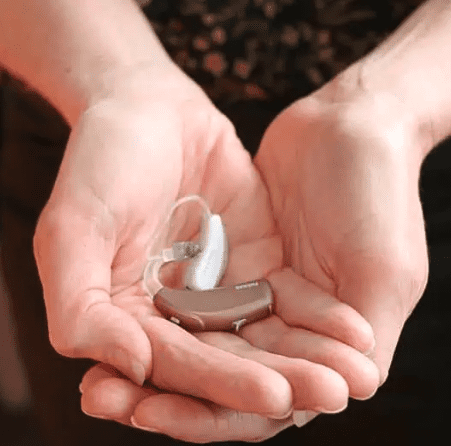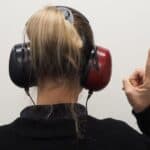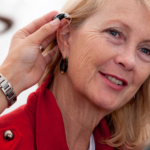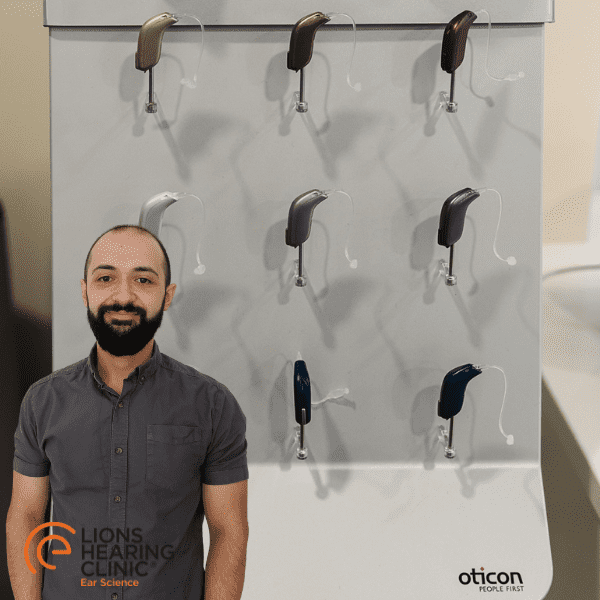Protecting your hearing is vital – once it’s gone, you can’t get it back.
Loud noises are a major cause of hearing loss – and depending on what you do for work (or in your spare time), you might be more at risk of Noise-Induced Hearing Loss (NIHL) than others.
How do I know when something is too loud?
Download a decibel reader app to help and a good rule of thumb is anything over 90db is considered dangerous – for example, the sounds from a motorbike, a sporting event, or a live band. Anything 70db or above should be limited, like using a vacuum cleaner or being exposed to loud traffic.
Helpful hint: when wearing earphones, you should have the volume low enough that if someone talks to you from one metre away, you can comfortably hear them.
Why is ear health surprisingly important for dads?
Are headphones destroying your kid’s ears?
Listen to Professor Marcus Atlas as he chats with Direct Advice for Dads Podcast.
Noisy workplace?
Hearing protection plugs
It is important to use hearing protection if you are exposed to noise, but the type of earplugs you need depends on the noise you are exposed to.
Earplugs that are too tight or too loose won’t protect your hearing properly, so if you work in a noisy environment, it’s best to use custom hearing protection plugs. Custom plugs are specially designed for your ears, and because the fit is nice and snug, they can be worn under earmuffs for added protection. Lions hearing Clinic can discuss the available options with you.
Are you a musician?
Musician’s earplugs
When you’re playing music, protection is important, but we understand that the quality of the sound you are hearing needs to be preserved. Musicians’ earplugs retain sound quality while protecting your ears from damage. Your Audiologist will select your earplugs based on what instrument you play, and what kind of sounds you want to filter out.
Using earphones?
Cap your exposure
Try to stick to the 60/60 rule: only turn your device volume up to 60%, and listen for no more than 60 minutes per day. Make sure to get earphones that fit well to reduce noise leaking out the sides, prompting you to turn it up.
Interested in the science? Discover how your ear hair cells work
Sound enters the ear and travels to the inner ear, also known as the cochlea. The cochlea is filled with fluid which moves, like a wave, in response to sound. The cochlea is lined with hair cells that gently bend and move as the wave travels through the inner ear.
Depending on which hair cells have bent and by how much, an electrical signal is sent to our brain that tells us about the pitch and volume of the sound. After a one-off, very loud concert you may have noticed your hearing had dropped slightly for a few days after the event. In this situation, which is called a temporary threshold shift, the hair cells have been sharply bent by the loud noise and have taken a few days to straighten themselves out.
Excessive or prolonged exposure to noise can cause these cells to remain bent or damaged and can even lead to hair cell death. Once hair cells are dead, they do not grow back, resulting in permanent hearing loss. Even one-off noises, if loud enough, can also cause permanent damage to your ears.
1. Nondahl DM, Cruickshanks K, Wiley TL, Klein MD, Klein BEK, Tweed TS (2000) Recreational firearm use and hearing loss. Archives of Family Medicine, 9(4), 352-357. 2. Gerges SNY, Sehrndt GA, Parthey W (2001) Noise Sources. Occupational exposure to noise: evaluation, prevention and control, (pp. 103-124). Retrieved from https://www.who.int/occupational_health/publications/noise5.pdf. 3. Smith PA, Davis A, Ferguson, M, Lutman, ME (2000) The prevalence and type of social noise exposure in young adults in England. Noise & Health 2(6), 41-56. 4. Alf Axelsson A, Sandh A (1985) Tinnitus in noise-induced hearing loss, British Journal of Audiology, 19(4),271-276. 5. Axelsson A, Prasher D (2000) Tinnitus induced by occupational and leisure noise. Noise & Health, 2(8), 47-54.






